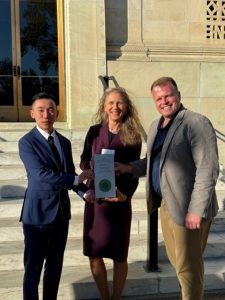October 26, 2023 BSEL director co-recipient of EPA Green Chemistry Award
A technology that converts hazardous wood products manufacturing chemicals into valuable components to produce biofuels, food flavoring, and fragrances has earned a WSU researcher a 2023 EPA Green Chemistry Challenge Award.

Harrison Yang, Kim Tutin and Joshua Heyne
Joshua Heyne, director of the Washington State University Tri-Cities Bioproducts, Sciences, and Engineering Laboratory (BSEL) and co-director of the WSU-Pacific Northwest National Laboratory Bioproducts Institute, and his colleague Harrison (Zhibin) Yang are a co-recipients of the award along with Kim Tutin, founder, and CEO of Captis Aire LLC.
This Chemical Adsorption Innovation Reduces Emissions (CAIRE™) technology converts terpenes, a waste product released during the wood manufacturing process, into valuable chemicals and controls pollutants. Currently these terpenes are burned as wastes. This releases greenhouse gases. Instead, the CAIRE™ Technology captures over 90% of the terpenes released from the wood products manufacturing process and converts them into many valuable chemicals including those used in products such as biofuels, flavors, and fragrances.
“We’re very proud of the EPA award and its recognition of the value of the CAIRE™ Technology,” Tutin said. “This innovation captures carbon from the air and provides key raw materials for biofuels, flavors, fragrances, and more. It is both economically and environmentally advantageous.”
“We are excited to partner with Captis Aire and Kim towards developing biofuels from terpene waste streams. The technology Kim is developing could play a key role in enabling new and better biofuels,” said Heyne.
According to information on the EPA website, the Green Chemistry Challenge Awards recognize the environmental and economic benefits of developing and using novel green chemistry. For this year’s competition there were six award categories: Greener Synthetic Pathways, Greener Reaction Conditions, The Design of Greener Chemicals, Small Business, Academic and Climate Change.
Since 1996 the EPA has presented the award to 133 winners whose work has significantly reduced the hazards associated with designing, manufacturing, and using chemicals.
BSEL is a teaching and research laboratory located on the WSU Tri-Cities campus in Richland. The program is a partnership between WSU and the Pacific Northwest National Laboratory. It provides space for critical research to advance the identification of useful non-energy products that can be used to promote energy sustainability. BSEL also plays a critical role in testing the viability of SAF products.




